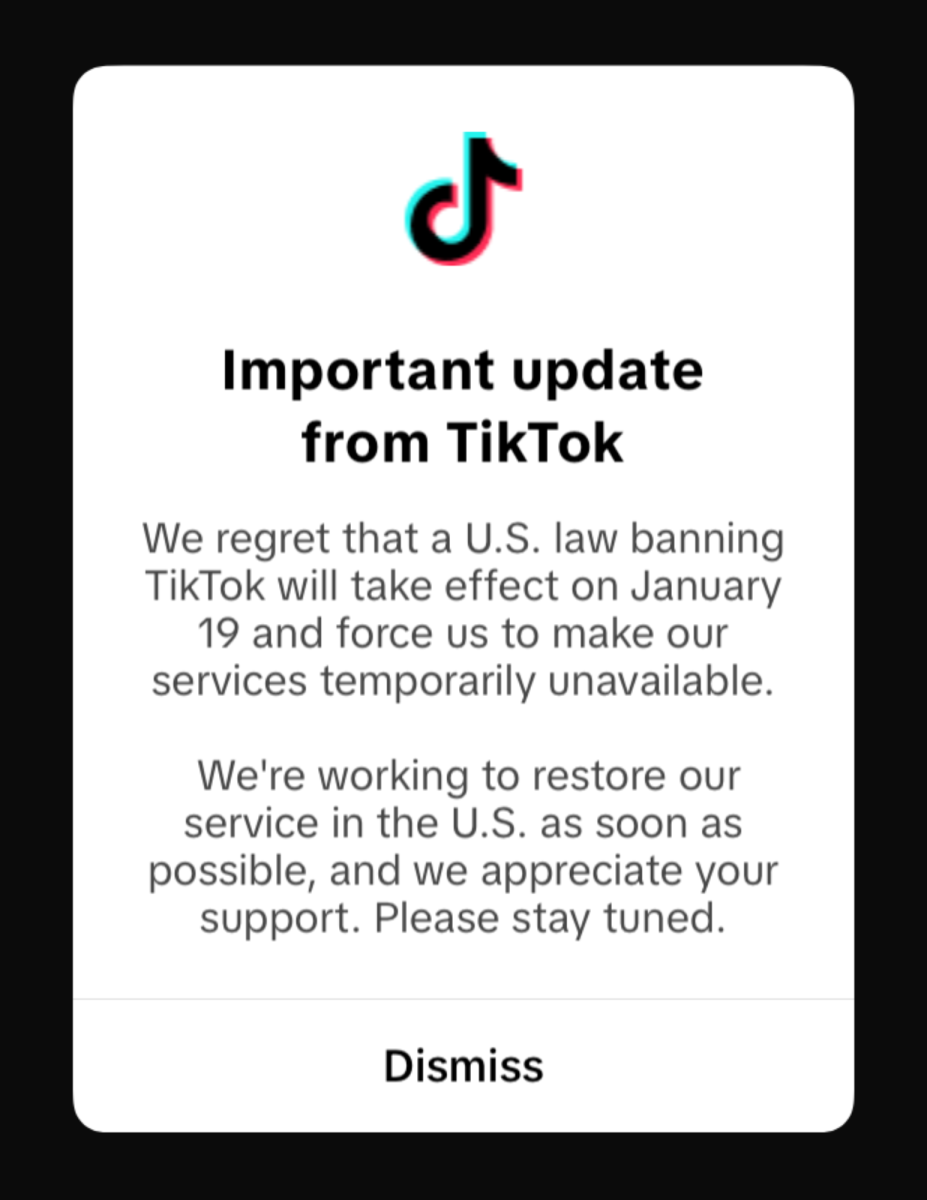On Jan. 19, the eve before President Donald Trump’s Inauguration, TikTok was officially banned sending shockwaves through social media only to be brought back 12 hours later.
Lawmakers banned the app citing concerns about national security given TikTok’s connection to China through its parent company ByteDance, but this sparked debate over free speech and digital privacy. With TikTok’s popularity among young people, this ban has left students wondering if the app is back to stay or if this is just the beginning of a larger battle.
“I think that just for it to come back 12 hours later it was unnecessary,” junior Victoria Cook said. “It’s not the end of the world, it’s just an app at the end of the day. But like them just taking it off the app store just to put it back and in access to people- like what is the issue?”
Many students expressed shock over the ban and its quick reversal. Students such as junior Isaiah Scott started questioning the government’s decision making process.
“All of the concerns they had about it in the first place were dumb,” Scott said. “And it didn’t work out at all. The concern was that it was selling our data to the Chinese communists.”
Younger generations have grown up using technology and never experienced government intervention to this extent. Students have voiced concerns about the recent government actions disproportionately targeting young users.
“This sounds really dystopian, but I feel like the government hates young people,” Cook said. “Especially our generation since we’ve grown up on social media and electronics. Like we’re learning things for ourselves and you know some governments experience, well not my experience, but past experience from other people, the government doesn’t like back talk in their country.”
If given the opportunity to speak to lawmakers, students such as junior Grayson Gunderson would emphasize the importance of freedom of speech.
“Be honest with the people actually using the app because we know it wasn’t about data or the Chinese. Nobody cares. Some people literally pledged their allegiance to China after it happened. We don’t care at all,” Gunderson said. “I mean it totally is infringing on our rights and they banned it anyway. They can just block and take away our free speech legally now. That’s insane.”
While the TikTok ban sparked widespread attention, some students believe that it diverts attention from larger issues going on in America.
“I would tell them there are bigger issues going on in the world right now. I think the last thing that should be on your list is a social media app which at the end of the day really isn’t hurting anyone,” Cook said. “I feel like it hurts in some ways but the bigger picture- is it hurting us now in this current moment? Compared to things like homelessness and famine. Like real world issues.”
TikTok is more than just an entertaining platform– it’s a source of income. Students like Gunderson have made good money via the app. Gunderson streams gaming lives on TikTok and earns commission from gifts given by viewers. The brief ban has affected the financial system of TikTok.
“I made in all probably over a thousand dollars in over a year of doing it. It was just extra pocket change,” Gunderson said. “They messed up some of the profit systems [with the ban] because they put all the features back really fast so that kind of messed up some of people’s actual growth and the actual money part of TikTok so that affected them. It didn’t affect me in any way because mine didn’t matter, mine comes from live payments while theirs comes from views and stuff.”
However, when it comes to entertainment, TikTok tops the charts on the app store. The night of the ban caused a ruckus on social media.
“It was bad. I called up my friends and we were all sitting there worried about it. And me, I’m gonna be honest, I tried to open it up a couple more times not even to see if it was working. It was just pure instinct to try to open up TikTok,” Scott said. “ I did it about 10 times after I realized it was already shut down and again when I woke up. But that’s how I found out it was back.”
Although the app returned to users 12 hours later, it is no longer available in the app store for download. This has caused some issues among people who have deleted the app believing it wouldn’t return in a day.
“The 12 hours that nobody had it, it seemed like the Earth was on fire for some, for me. But I got used to it,” Cook said. “Actually, unfortunately, I still don’t have TikTok because I deleted it off my phone. I hate to admit I just scroll on Instagram reels instead. There’s still an empty hole in my heart.”
Despite TikTok not being available on the app store anymore, many students have found new ways to spend their free time. The TikTok ban has some positives along with it.
“Honestly I feel like I have more free time. I know that’s bad but instead of doom scrolling on TikTok I’ve been reading more,” Cook said. “There’s a lot you can come across on TikTok, some negative, some positive but I think overall yes, my mood has been lifted.”
A federal law passed by the Biden Administration last year intended to force ByteDance to sell TikTok to a non-Chinese owner or face a ban on all app stores. Shortly after Trump’s inaguration, President Trump signed an executive order halting the enforcement of the ban for 75 days, and instructed the attorney general not to take actions to enforce the law until his administration could determine the next path forward.


